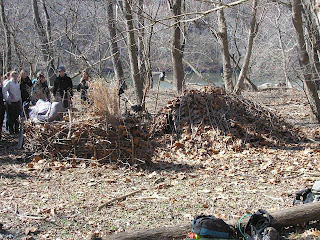Ancestral Knowledge is proud to say this year's MAPS Meet was a great success.
The overall feedback? "Totally awesome."
Okay, so there were some hiccups, but taking into considerations the growing pangs of the event and adjusting to a new site, everyone seemed quite pleased with the event. Even so there will be obvious changes for the future.
Boy Scout Camp William B Snyder was a fabulous camp. The natural resources on the property were amazing. Edible and Medicinal plants everywhere, Clay on site, Greenstone just down the road, a huge wet land that was just incredible, tracking opportunities galore and the 12x12 tents were a treat for sure. Even the dining hall was ultra modern and with AC (we were spoiled).
The Kids Program was a Great success. I heard nothing but good things about it and we hope to have it again next year. Thank you Living Earth School!
We have reviewed your comments!!
Thank you for all the suggestions that will allow things to run a bit smoother next year. Evaluations forms are a great place to voice suggestions and opinions.
Here are some changes that will make a big difference next year (if we are a Snyder again):
- We will utilize the front half of the camp to limit the distance traveled
- We will centralize the camping and teaching areas
- We will have a bulletin board at the central fire with all the sessions and map posted
- We will have a larger work trade group and a smoother volunteer crew system
- There will be a "meet the instructors" session on Wednesday after dinner so everyone can see the skill and ask questions about them before hand
- There will be a map to the instructors teaching areas posted in the dinning hall and at the central fire
- The session announcements will be after dinner prior to the next days activities so we waste no time at the fire
- There will be a baby sitting Co-op for kids 6 and under. (this will be run by the parents, we will supply the sign up sheet)
- The Camp organizer will have an assistant/helper
- Check in will be at the front of camp
- There will be an archery range
Here is the good news:
Ancestral Knowledge raised over $1100 from donations and through the silent auction. $660 for land, $260 scholarships and $200 for programming.
Thank you all for your support. Especially, a grand thank you to all the instructors.
If it wasn't for the instructors willingness to teach and the participants eagerness to learn this event would never happen.
Thanks MAPS Meet 2008 Skill Session Instructors
Keith Grenoble, Jeff Gottlieb, Jack Davis, Jan Macario, Tim MacWelch, Hub and Kate Knott, Cal Reed, Eric Bravo, Lauren Jacobs, Matt Bukowski, Robin Blankenship, Fuz, Bill Kaczor, Guy Neal, Snow bear, Joe Murray, Chris Maness, Russell Cutts, Jim Roaix, Chuck Acker, Dan Coates, Stewart Grey, Rick and Jamey Hueston, Matt Cohen, Wendy Nufer, Mark Seaver, Doc and Linda Garcia, Christina Gordon, Marsha Verber, Owen Budd, Wesley Greene, Stewart Grey, Owen Budd, Natalie Nicklett, Brigitta Carr, Benjamin Shender, and David Friedman
We hope to see you all again next year.
 We had a great time at Still Point, the new home of our summer programs as well as other survival based workshops. We were there for a work weekend and several volunteers showed up to help with trail maintenance and splitting wood for the winter. I think it was almost 4 cords. Two of our volunteers braved the storm and the mountain roads to help out.
We had a great time at Still Point, the new home of our summer programs as well as other survival based workshops. We were there for a work weekend and several volunteers showed up to help with trail maintenance and splitting wood for the winter. I think it was almost 4 cords. Two of our volunteers braved the storm and the mountain roads to help out.
 On Sunday I even had the chance to cut my leg with the chainsaw. Now thats living dangerously. Thankfully it wasn't serious.
I also had the opportunity to go on an incredible sunrise walk where I ran into several deer. Stalking on the wet forest floor weaving through the paw paw saplings feeling e
On Sunday I even had the chance to cut my leg with the chainsaw. Now thats living dangerously. Thankfully it wasn't serious.
I also had the opportunity to go on an incredible sunrise walk where I ran into several deer. Stalking on the wet forest floor weaving through the paw paw saplings feeling e verything wake up around me and start there day. It was refreshing to say the least. When i got back to the cabin I sat and looking at the fog that sat in the Shenandoah Valley due. It made me feel like I was above the clouds on the tallest mountains in the world. This place is magical.
verything wake up around me and start there day. It was refreshing to say the least. When i got back to the cabin I sat and looking at the fog that sat in the Shenandoah Valley due. It made me feel like I was above the clouds on the tallest mountains in the world. This place is magical.








